Welcome to your NCLEX practice questions quiz and reviewer for gastrointestinal disorders. In this nursing test bank, test your competence on the diseases that affect the digestive, biliary, and more. This exam aims to provide a better understanding of the importance of providing patients with appropriate care following gastrointestinal procedures and addressing both physical and emotional issues to assist the patient’s continuing care. Accomplish this exam and do good on your NCLEX!
Gastrointestinal System Disorders NCLEX Practice Quiz
This section contains the practice problems and questions about gastrointestinal disorders and their nursing management. This nursing test bank set includes 300+ questions. The topics included are pancreatitis, ostomy care, inflammatory bowel disease, diverticulitis, liver failure, liver disorders, appendicitis, hiatal hernia, esophageal disorders, hepatitis, and more.
Quiz Guidelines
Before you start, here are some examination guidelines and reminders you must read:
- Practice Exams: Engage with our Practice Exams to hone your skills in a supportive, low-pressure environment. These exams provide immediate feedback and explanations, helping you grasp core concepts, identify improvement areas, and build confidence in your knowledge and abilities.
- Challenge Exams: Take our Challenge Exams to test your mastery and readiness under simulated exam conditions. These exams offer a rigorous question set to assess your understanding, prepare you for actual examinations, and benchmark your performance.
- You’re given 2 minutes per item.
- For Challenge Exams, click on the “Start Quiz” button to start the quiz.
- Complete the quiz: Ensure that you answer the entire quiz. Only after you’ve answered every item will the score and rationales be shown.
- Learn from the rationales: After each quiz, click on the “View Questions” button to understand the explanation for each answer.
- Free access: Guess what? Our test banks are 100% FREE. Skip the hassle – no sign-ups or registrations here. A sincere promise from Nurseslabs: we have not and won’t ever request your credit card details or personal info for our practice questions. We’re dedicated to keeping this service accessible and cost-free, especially for our amazing students and nurses. So, take the leap and elevate your career hassle-free!
- Share your thoughts: We’d love your feedback, scores, and questions! Please share them in the comments below.
Please click on the links below to be redirected to the quiz page.
Recommended Resources
Recommended books and resources for your NCLEX success:
Disclosure: Included below are affiliate links from Amazon at no additional cost from you. We may earn a small commission from your purchase. For more information, check out our privacy policy.
Saunders Comprehensive Review for the NCLEX-RN
Saunders Comprehensive Review for the NCLEX-RN Examination is often referred to as the best nursing exam review book ever. More than 5,700 practice questions are available in the text. Detailed test-taking strategies are provided for each question, with hints for analyzing and uncovering the correct answer option.
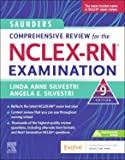
Strategies for Student Success on the Next Generation NCLEX® (NGN) Test Items
Next Generation NCLEX®-style practice questions of all types are illustrated through stand-alone case studies and unfolding case studies. NCSBN Clinical Judgment Measurement Model (NCJMM) is included throughout with case scenarios that integrate the six clinical judgment cognitive skills.
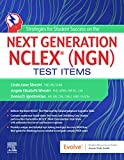
Saunders Q & A Review for the NCLEX-RN® Examination
This edition contains over 6,000 practice questions with each question containing a test-taking strategy and justifications for correct and incorrect answers to enhance review. Questions are organized according to the most recent NCLEX-RN test blueprint Client Needs and Integrated Processes. Questions are written at higher cognitive levels (applying, analyzing, synthesizing, evaluating, and creating) than those on the test itself.
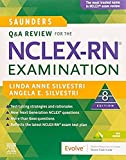
NCLEX-RN Prep Plus by Kaplan
The NCLEX-RN Prep Plus from Kaplan employs expert critical thinking techniques and targeted sample questions. This edition identifies seven types of NGN questions and explains in detail how to approach and answer each type. In addition, it provides 10 critical thinking pathways for analyzing exam questions.
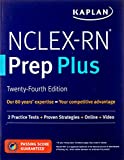
Illustrated Study Guide for the NCLEX-RN® Exam
The 10th edition of the Illustrated Study Guide for the NCLEX-RN Exam, 10th Edition. This study guide gives you a robust, visual, less-intimidating way to remember key facts. 2,500 review questions are now included on the Evolve companion website. 25 additional illustrations and mnemonics make the book more appealing than ever.
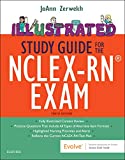
NCLEX RN Examination Prep Flashcards (2023 Edition)
NCLEX RN Exam Review FlashCards Study Guide with Practice Test Questions [Full-Color Cards] from Test Prep Books. These flashcards are ready for use, allowing you to begin studying immediately. Each flash card is color-coded for easy subject identification.
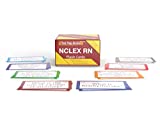
Recommended Links
An investment in knowledge pays the best interest. Keep up the pace and continue learning with these practice quizzes:
- Nursing Test Bank: Free Practice Questions UPDATED!
Our most comprehenisve and updated nursing test bank that includes over 3,500 practice questions covering a wide range of nursing topics that are absolutely free! - NCLEX Questions Nursing Test Bank and Review UPDATED!
Over 1,000+ comprehensive NCLEX practice questions covering different nursing topics. We’ve made a significant effort to provide you with the most challenging questions along with insightful rationales for each question to reinforce learning.
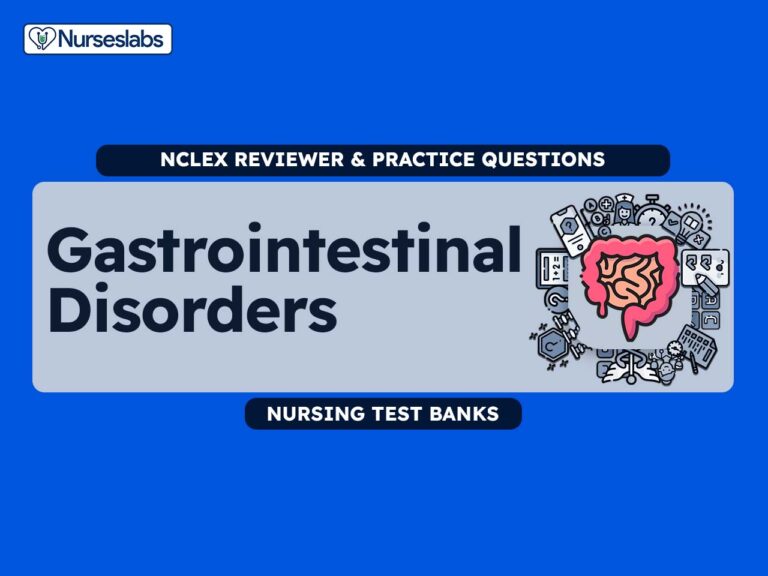
Your site is really helpful . I enjoy coming here to study and answer questions.
This site is really helpful!
I can’t access to the questions
Works fine on my end, Sharon. May I know what browser you are using?
Opera mini I can’t access the questions
I think you’ll be needing a better browser for that. Opera Mini has lots of limitations on Javascript. May I suggest using Chrome for mobile or any modern browser?
According to ATI Edition 11.0, Meperidine is discouraged in treating pain for acute pancreatitis. There is a risk for seizures, especially in older adult clients. However, the rationale in Quiz 1 #12 says meperidine is the drug of choice instead of morphine sulfate.
There is a problem in seeing the correct answers. So now i cannot review my exam. I felt sad
Good study website. I learn new materials on this website. Thank you putting in together.
Thank you Nurseslabs.com. I referred this site for review of my recent NCLEX RN exam.Tips and strategies for taking each of the exam categories were very helpful for me to pass the Razak with minimum questions in my first chance.
Thank you once again.
God Bless🙏
Quiz #2, question #31 the correct abdominal assessment is
Inspection, Auscultation, Percussion, Palpation
In the answer says: inspection, auscultation, palpation and percussion !!! That’s WRONG!!!
This has been fixed. Yes, the correct sequence should be inspection, auscultation, percussion, and lastly palpation. Thanks for letting us know.
I LOVE YOUR SITE AND AM SUPER GRATEFUL FOR IT. I have however identified a question that I believe to be incorrect.
Gastrointestinal System Disorders NCLEX Practice | Quiz #3: 50 Questions Question 48. I believe the correct answer should be
Option C: A healthy stoma is pinkish-red and moist. The stoma should stick out slightly from the skin. It is normal to see a little mucus. Spots of blood or a small amount of bleeding from the stoma is normal.
Hi Tammy, we’re happy to know that you love our site! As for your question, D is the correct answer as the question is asking “Which finding do you report to the doctor?” Hope this helps!
For Quiz #5 question 35:
“When used with hyperacidic disorders of the stomach, antacids are given to elevate the gastric pH to:
The answer given is 2.0, but wouldn’t using an antacid make the gastric pH LESS acidic (meaning higher pH)? I would guess the correct answer to be 6.0 as it’s the closest option to neutral.
Medical student
Thank you nurses lab .com I am student of BSN 3rd semester
Thank you so much…
Best site ever…..